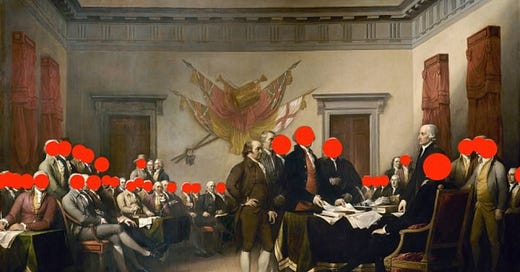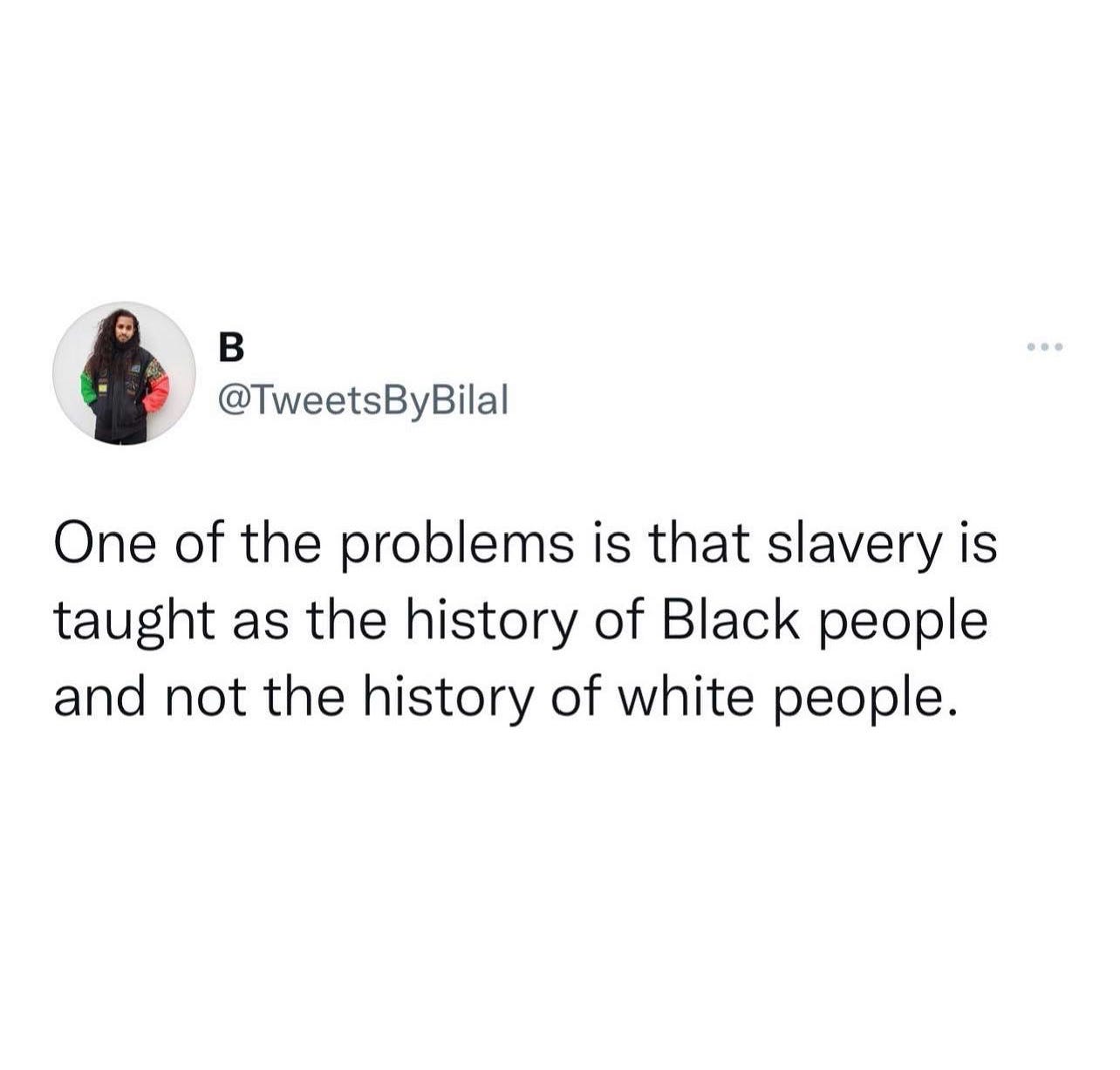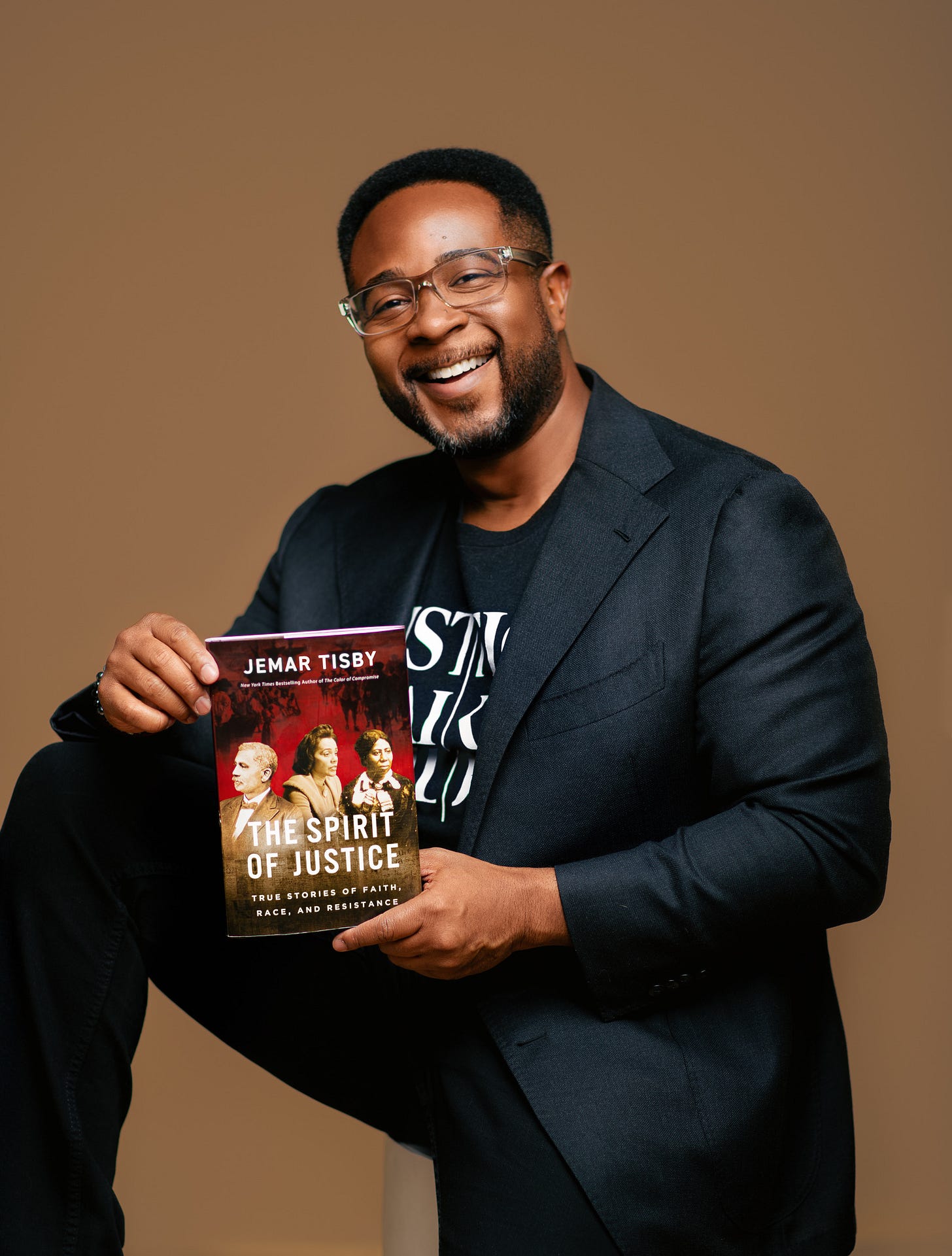Slavery Was a White People Problem
How we frame who was involved and impacted matters to how we understand the issue.
I am constantly scanning the news and social media to bring you the latest info on race, history, and justice. It is time consuming and laborious. I am glad to do it, but I need your help to keep it up. Become a paid subscriber today.
We typically teach the history of slavery as “Black history”, but it should also be taught as the history of white people.
Examining race-based chattel slavery should certainly center Black people. We were the ones most adversely affected by this commerce in human beings.
Our voices have too often been silenced or ignored as a way of deflecting the crisis of racism and white supremacy. Our stories must be heard and respected.
How you frame an issue, however, matters significantly to how you understand it.
Myopically focusing on Black people as the victims of slavery risks underplaying the culpability of white people in creating and perpetuating the institution.
I ran across the following post on social media that succinctly captures the problem with viewing the history of slavery from a single perspective.
The role white people played in race-based chattel slavery, racial segregation, and ongoing forms of racism can often be an afterthought.
Students of history must remember that the passive voice is a problem. History does not simply happen—there are actors, agents, and individuals who made history.
White people codified race-based chattel slavery in the United States. They created a white supremacist ideology and even a white supremacist theology to undergird their exploitation and dehumanization of Black people.
They were the enslavers, the plantation owners, the rapists, the slave traders, and the profiteers who made fortunes off the scarred backs of enslaved Black people.
And slavery did not only harm Black people.
Frederick Douglass said, “No man can put a chain about the ankle of his fellow man without at last finding the other end fastened about his own neck.”
Pop culture examinations of slavery focus on the the chain around the ankle of Black people without giving due recognition to the other end around the necks of white people.
When the attention around slavery, and racism more generally, is solely on Black people, society places the onus for addressing racism mainly on Black people.
White people end up poorly equipped to see racism as their problem, too, and one for which they need to offer redress and repair.
When you speak of slavery—and racism and white supremacy—as the invention of white people, then the focus shifts.
White people have to examine their own racialized identities and how their status as “white” grants them social, political, and economic privileges while also deforming their hearts and warping their morality.
There is now an entire academic field devoted to uncovering the reality and deleterious effects of white supremacy and white privilege with white people as the focus.
It’s called “whiteness studies” (and “critical whiteness studies…and the far-right is guaranteed to HATE it!).
Persons who identify as white rarely have to think about their racial identity because they live within a culture where whiteness has been normalized.
Thinking about race is very different for nonwhite persons living in America. People of color must always consider their racial identity, whatever the situation, due to the systemic and interpersonal racism that still exists. | NMAAHC
If you are serious about racial justice, then studies of slavery and racism cannot focus solely on Black people or other people of color.
Such examinations have to encompass the roles and responsibilities that white people had in creating a racial hierarchy and their obligations for dismantling it.
Have you heard of whiteness studies? How might a more intentional focus on white people affect our study of racial history? Comment below.
For a more constructive focus on Black people before, during, and after slavery, pre-order my book, “The Spirit of Justice.”







I have not heard of whiteness studies until reading this post. I think it should be taught starting in first grade. As you point out, the way slavery, Jim Crow, and racism are taught now is that they “happened” to Black people. This history should be taught from the lens of what white people did to Black people; from enslavement to Jim Crow to redlining to voter suppression to the criminal justice system. The white church needs to clean its house too. Their gospel of “color blindness” needs to be consigned to the dumpster. Anthea Butler’s “White Evangelical Racism” should be required reading in every seminary.
Thank you so much for sharing this article. I have long found framing of the issues around racism skewed.
When I look at photos of the white mobs at lynchings or screaming white parents during school desegregation, I keep wondering why no one is focusing the lens on the white crowd. Who are these people, who are their families, how does the evil they participate in affect their home life, what traits and habits of hate, anger and murder get passed down to their generations.
The quote from Frederick Douglass makes clear the irony of oppression "No man can put a chain about the ankle of his fellow man without at last finding the other end fastened about his own neck"
These are insights I have been curious about but have not been able to find studies on. Thanks so much for recommending whiteness studies, I hope I can find answers to my questions there